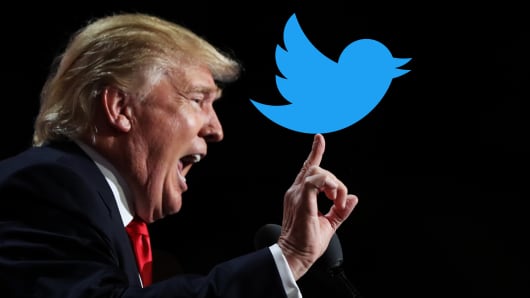Trump has threatened to "live Tweet" his responses to fired FBI director James Comey's testimony before Congress on Thursday.
Trump's incessant tweeting has given Republicans and Democrats something in common. Both sides of the aisle are begging President Trump to "stop tweeting already!"
Even some of his staunchest supporters are worried about the ramifications of his more controversial missives.
But for the sake of America's long suffering democracy, let's hope Trump answers their burning desire to squelch his digital outbursts with "Never."
Trump's tweets are actually good for America.
Sure, there's been Twitter backlash. The most immediate case stems from his rants about the London Bridge terror attacks, where President Trump used the incident to promote his travel ban policy now inevitably headed to the Supreme Court.
In a stunning rebuke considering the source, prominent attorney George Conway -- who is also the husband of Trump spokesperson Kellyanne Conway -- castigated the president for tweeting those comments which he warned could undermine the administration's case before the high court.
Others think President Trump's reported intention to "live tweet" his responses during former FBI Director James Comey's Senate testimony Thursday could put the president in legal jeopardy or fuel impeachment efforts against him.
But those concerns are focusing too much on President Trump's image and not enough on the historic and long overdue real access the American people now have to the chief executive.
They're missing the fact that for too long, the public has become used to a president who is literally shielded from the public by Secret Service agents, spin doctoring political strategists, and a massive and expensive White House communications staff that styles and blow dries every word out of any given administration.
In other words, this is good for democratic openness, good for the American people, even as it's sometimes bad for President Trump himself.
Critics of Trump's tweeting from the right and left have one thing in common: They don't seem to want President Trump to be judged for who he is. The Trump-haters don't want him connecting with the still significant number of people who obviously identify with him and his visceral thoughts. And supporters are eager to protect a public Trump persona. Both of these factions have a good case in their arguments, but neither is good enough.
Let's refute the Trump supporters' argument first. They're missing that it was Trump's genuine and definitely not sterilized image and behavior that played a big role in his election. Much of that played out on Twitter.
By comparison, remember that Hillary Clinton actually tweeted a lot during the 2016 election too. But her tweets were too obviously managed and many were likely written by staffers. The "twitterverse" was not fooled. And that kind of insincere messaging/packaging cost Clinton on Election Day.
As president, Trump's tweets often connect on a powerful level. After the London attacks, many Americans indeed wondered how our government was working to prevent something like that happening here. Others were astounded that the British authorities knew about the sketchy backgrounds of at least two of the attackers and apparently didn't do nearly enough to stop them.
Trump's tweets echoed those thoughts effectively, even if they didn't fit the political class' definition of presidential behavior. By contrast, Mitt Romney was something out of central casting for "dignified-looking presidential candidate," and a lot of good that did him.
Perhaps the best example of a series of tweets that hurt President Trump was when he accused President Obama of wiretapping him at Trump Tower, an accusation he made with no evidence to back up his claim. Yes, the lie drudged up endless hours of press coverage and deflected from the actual Russia investigation, but at least those tweets brought to an end a period where President Trump was being disingenuously nice to President Obama.
For Trump-haters who say his tweets are embarrassing the country and fly in the face of the society our Founding Fathers would have wanted, they might want to brush up on their American history.
Founding Father Alexander Hamilton, who was a pugnacious and extremely prolific writer, would probably be a fierce Twitter and Facebook user today. Even President Thomas Jefferson engineered and helped write his share of nasty content that would have lit up the social media sites if they were around in the 1790s and 1800s.
This country and even the presidency have survived worse than Donald Trump's sometimes ill-advised tweets. We'll get through this too.
The real story is that the American people have waited far too long to get a true picture and real access to the men and women in political power. By a crazy stroke of luck, our current president has decided he wants to provide it to them.
That decision often comes at his own peril and those who want to worry about President Trump's personal status have every reason to be alarmed. If President Trump were wiser here, he'd continue to cash in on his genuine tweeting but avoid sending out the most potentially personally damaging messages. He needs to go on a slight twitter diet, but not go cold turkey.
For the rest of us, this is actually a good development and it would be beneficial if it continued. If the next president retreats back to obviously well-coordinated speeches and comments only, it will look even more secretive and phony in comparison than it did before the Trump era. And if Trump himself suddenly goes dark online, you can expect suspicions and conspiracy theories about him and his administration to rise, not fall.
So Trump is pretty much stuck in twitterland for the rest of his presidency. He just needs to try to make the best of it. But we're winning either way.
Commentary by Jake Novak, CNBC.com senior columnist. Follow him on Twitter @jakejakeny.
For more insight from CNBC contributors, follow @CNBCopinion on Twitter.



